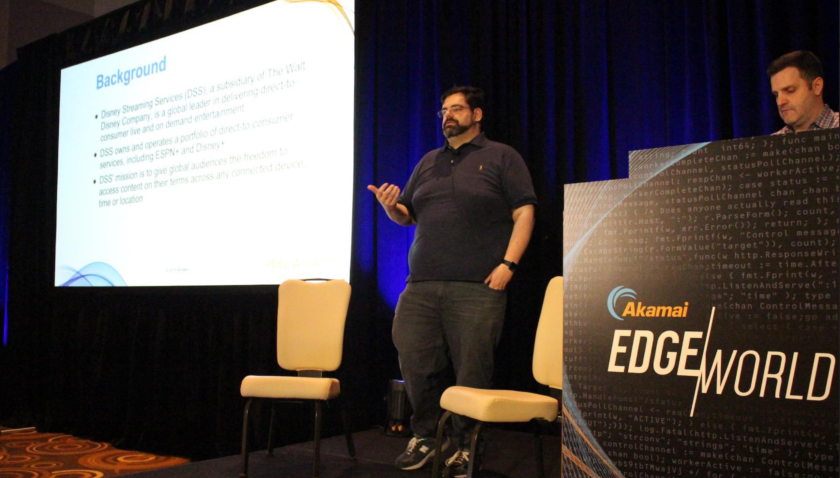M+E Daily

Disney Streaming Services Looks to CDNs to Help Lock Down Content
Story Highlights
LAS VEGAS — With consumer demand for streaming content at an all-time high, and delivering that content globally, while also maintaining strong access controls, is proving to be a challenge for content owners.
Eric Klein, director of infrastructure delivery for Disney Streaming Services, took to the stage June 13 at Akamai’s Edge World 2019 event to share how Akamai and other content delivery network (CDN) providers are helpful in not only delivering all that content, but helping content owners lock it down as well.
“We have a lot of content we’re delivering to a lot of customers across multiple CDNs,” Klein said. “We need to be sure our origins are protected.”
Content access control requires edge-based enforcement, geo-protection, time-bound tokenization schema, and real-time detection of tokenization misuse. And for Disney Streaming Services — which owns and operates both ESPN+ and the upcoming Disney+ service — uses everything CDNs offer to keep content out of the wrong hands.
“Because we encrypt our content, you won’t be able to play it [without access],” Klein said. “But you can still download those bytes. And that’s a problem.” Real-time detection services can help prevent situations like that, he said.
Klein also praised the testing and monitoring services CDNs offer today, saying they can prove invaluable. “Leverage those appropriately and you can discover where your content is being cached, and how long it stays there for,” he said.
Meanwhile, also at the Edge World 2019 conference, the teams at both Akamai and Microsoft Azure celebrated their recent partnership, which sees Akamai Edge delivery integrated directly with Azure Media Services and Azure Blob Storage, giving media companies the ability to combine cloud-based video processing with edge delivery, at a lower cost.
“We were customers for each other’s products for a long time,” said Michael Johnson, senior partner development manager for Microsoft. “But it evolved into a partnership.”
The collaboration allows clients to ingest a live, single bitrate stream into Azure, and output a secured adaptive bitrate stream for multiple formats, and do so at scale. Akamai directly connects its edge network to Azure (using a high-speed Azure ExpressRoute connection), resulting in efficiencies when storing and delivering content, and providing mutual customers a more predictable cost structure.
Akamai also enhances the delivery of live and on-demand streaming workflows through Azure Media Services, and is working with Azure to improve the quality of streaming delivery, and deliver lower latencies.
“What we’re doing is defining how to route traffic on their edge,” said David Sayed, senior director of Azure Media for Microsoft. “That helps us predict what traffic is going where.”
The Akamai-Azure partnership also sees Akamai enabling some customer solutions to run on Azure, and has its products available in the Azure Marketplace.









